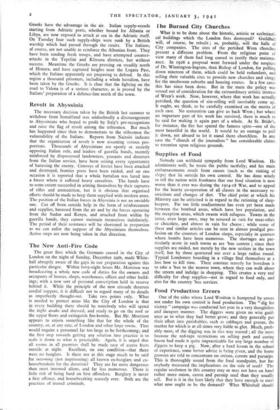Supplies of Food
Nobody can withhold sympathy from Lord Woolton. He administers well; he treats the public tactfully; and his main embarrassments result from causes (such as the sinking of ships) that lie outside his own control. He has done wisely to tell the nation with frankness that our food situation is now worse than it ever was during the 1914-18 War, and to appeal for the hearty co-operation of all classes in the necessary re- strictions and changes of diet. The chief point at which his Ministry can be criticised is in regard to the rationing of shop- keepers. Far too little readjustment has even yet been made between the bombed areas, which have lost population, and the reception areas, which swarm with refugees. Towns in the latter, even large ones, may be scoured in vain for meat-offals or chocolate, and almost in vain for cheese ; while some of these and similar articles can be seen in almost prodigal pro- fusion on the counters of London shops, especially in quarters where .bombs have been numerous. The shortages are par- ticularly acute in such towns as are 'bus centres ; since their supplies are raided, not merely by the new settlers in the town itself, but by those quartered out over a large radius round. Typical Londoners boarding in a village find themselves at a loss how to kill time. Their constant remedy for boredom is to take a 'bus to the nearest town, where they can walk about the streets and indulge in shopping. This creates a very real difficulty for shop supplies—not in regard to food only, and also for the country 'bus services.






























 Previous page
Previous page